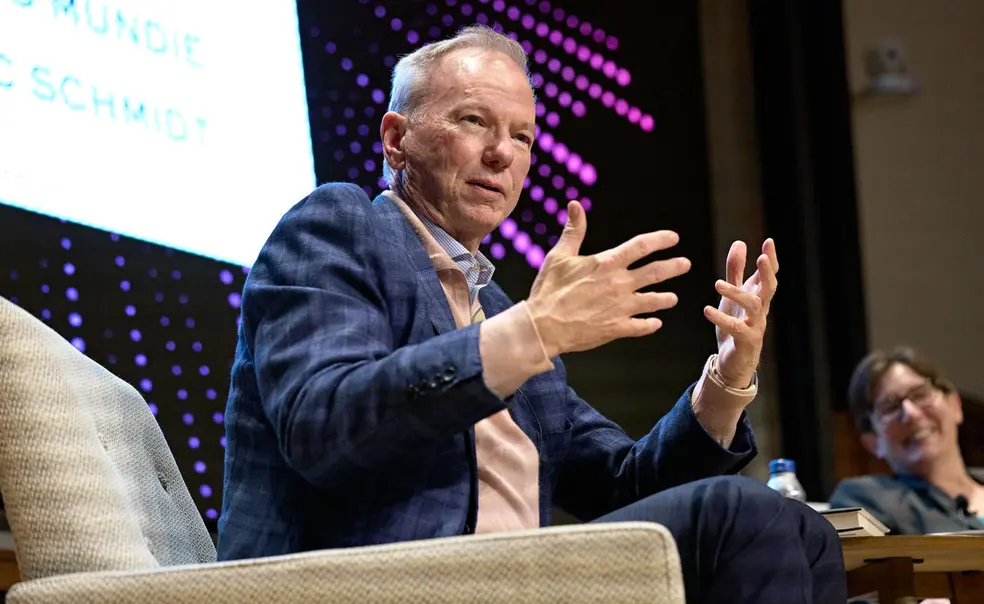Eric Schmidt ’76, Former Google CEO, Talks About the Future of AI
Schmidt spoke at Princeton to promote his new book, co-authored by Henry Kissinger
Tech mogul and philanthropist Eric Schmidt ’76, the former CEO and executive chairman of Google, returned to Princeton on Nov. 20 to debut his newly published book, Genesis: Artificial Intelligence, Hope, and the Human Spirit, and discuss how AI is poised to change the world.
Nearly every seat in McCosh 50 was full as Schmidt, in conversation with Provost Jennifer Rexford ’91, described how the evolution of AI will be “a very big deal” and impact many aspects of daily living — from education to health care to safety — which will improve the quality of life. For instance, he expects “an enormous, sort of Cambrian explosion of medical solutions” to be realized with AI’s advanced decision-making skills, as well as new energy systems that will require AI to address climate change.
Schmidt encouraged students to learn alongside AI. When a history Ph.D. student asked what advice Schmidt has for those pursuing the humanities, he recommended using AI as a tool to make queries and gain deeper insight about their chosen fields of research.
Schmidt warned that the situation with AI is “tricky” as “evil exists in the world,” stating it is “probably a more powerful weapon than the biggest weapons programs the U.S. sponsors.”
In addition to the possibility of physical danger, Schmidt spoke about how AI may jeopardize identity and cultural values, as daily interactions with AI become routine and norms change. “You’re playing with the way people think.”
He also emphasized that “normal people are not ready” for AI — citing the example of questions that may arise for a parent when their child’s best friend is AI — nor is government. “The government processes are not ready. The doctrines are not ready.”
Schmidt said the Princeton community will be asking and answering some of the industry’s greatest questions and challenges, in part because the University may be one of the few institutions that can afford the “extraordinary capital cost[s]” of building a data center.
“It’s your turn now,” he said.
Schmidt was CEO of Google from 2001 to 2011 and executive chairman from 2011 to 2015. He then moved to Alphabet, Google’s parent company, to serve as executive chairman and technical adviser. He was a member of the President’s Council of Advisers on Science from 2009 to ’17 and has worked with presidents Barack Obama and Donald Trump.
In 2017, with his wife, Wendy, Schmidt launched Schmidt Futures, which “supports projects at the intersection of talent and technology, centered on specific, finite challenges,” according to its website. The couple has since founded a network of philanthropic organizations including Schmidt Sciences, a nonprofit launched earlier this year to identify and fund “researchers pursuing early-stage, high-risk hypotheses” in five areas: AI and advanced computing, astrophysics and space, biosciences, climate, and science systems.
Schmidt was a member of Princeton’s Board of Trustees from 2007 to 2010 and has made several sizable gifts to the University, including funds to rebuild and expand Guyot Hall, which will serve as the new home of the computer science department when it re-opens as Eric and Wendy Schmidt Hall in 2029, according to the University. He is also an emeritus board member of the Institute for Advanced Study, where he was trustee for 12 years.
During his talk with Rexford, Schmidt entertained the audience with the story of how he met his late co-author Henry Kissinger, former Secretary of State, about 15 years ago at a conference when the diplomat asked how to remove unfavorable results about himself from Google. Schmidt ended up inviting Kissinger to Google, where “he then announced to the entire unit, employee body, that Google was a threat to modern civilization, which everyone at Google loved.” Genesis is the last book Kissinger co-authored before his death last year.
Craig Mundie, a former senior adviser to the CEO of Microsoft, also co-authored the book, which was published by Little, Brown and Co. on Nov. 19.
The first 250 attendees received a copy of the book, and the event was livestreamed online; a recording is available on the University’s YouTube channel.












No responses yet